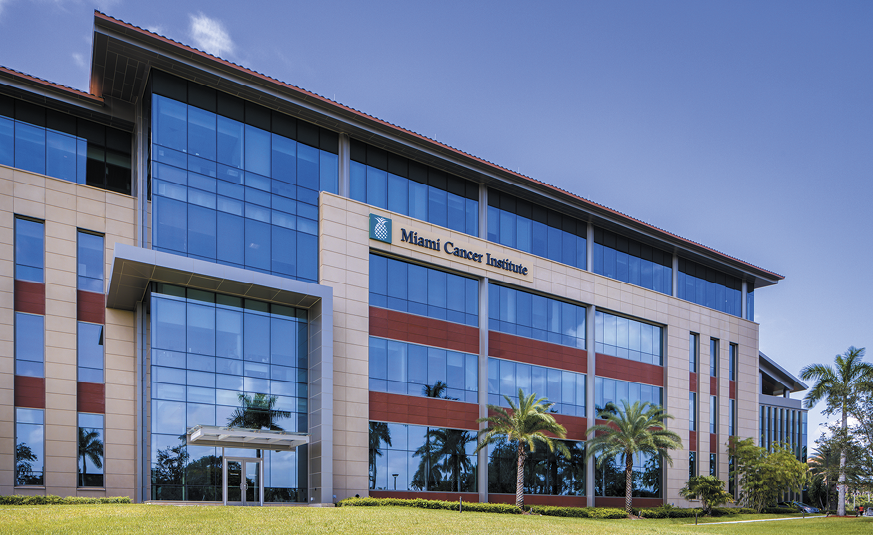- Home
- Media Kit
- MediaJet
- Current Issue
- Past Issues
- Ad Specs-Submission
- Reprints (PDF)
- Photo Specifications (PDF)
- Contact Us
- PRIVACY POLICY
- TERMS OF USE
![]()
ONLINE
![]()
ONLINE

Transforming Cancer Care
Editors’ Note
Dr. Michael Zinner is a world-renowned cancer surgeon and researcher. He was named founding CEO and Executive Medical Director of Baptist Health Miami Cancer Institute and Baptist Health Cancer Care in October 2015. An expert in pancreatic-hepatobiliary diseases, Zinner joined Miami Cancer Institute from Dana-Farber/Brigham and Women’s Cancer Center in Boston, where he was Clinical Director and Surgeon-in-Chief at the Brigham and Women’s Hospital from 1994 to 2015. He is also the Moseley Professor of Surgery, Emeritus at Harvard Medical School and founder of Harvard’s Center for Surgery and Public Health. Prior to his Boston experience, he was Chairman of the Department of Surgery at UCLA from 1988 to 1994. Zinner was co-founder and co-director of the Gastrointestinal Cancer Center at Dana-Farber Cancer Institute, a multidisciplinary clinical program of surgeons, oncologists, radiation therapists, radiologists, and pathologists. The author of more than 265 peer reviewed academic papers, he was a member of the editorial boards of Annals of Surgery, Journal of Gastrointestinal Surgery, and the Journal of the American College of Surgeons. From 2008 to 2010, Zinner served as Chairman of the Board of Governors, and then from 2016 to 2017 as the Chairman of the Board of Regents, of the American College of Surgeons (ACS) which has more than 80,000 members. He was the former Chairman of the Health Policy and Advocacy Committee of the College. Throughout his distinguished career, Zinner has been widely recognized for his extraordinary clinical accomplishments, his contributions to cancer treatment and research, and his mentorship to students, physicians and researchers worldwide. A Miami native, Zinner received his MD degree from the University of Florida and did his surgical residencies at The Johns Hopkins Medical Institutes in Baltimore.
Institution Brief
Miami Cancer Institute (miamicancerinstitute.com) brings to South Florida access to personalized clinical treatments and comprehensive support services delivered with unparalleled compassion. No other cancer program in the region has the combination of cancer-fighting expertise and advanced technology – including the first proton therapy center in South Florida, Latin America, and the Caribbean, and one of the only radiation oncology programs in the world with each of the newest radiation therapies in one place – to diagnose and deliver precise cancer treatments that achieve the best outcomes and improve the lives of cancer patients. The Institute offers an impressive roster of established community oncologists and renowned experts, clinical researchers and genomic scientists recruited from the nation’s top cancer centers. Selected as Florida’s only member of the Memorial Sloan Kettering Cancer (MSK) Alliance, Miami Cancer Institute is part of a meaningful clinical collaboration that affords patients in South Florida access to innovative treatments and ensures that the standards of care developed by their multidisciplinary disease management teams match those at MSK.

Baptist Health Miami Cancer Institute
Will you highlight the history of Miami Cancer Institute and how you define its mission?
Baptist Health South Florida began planning for a standalone cancer center connected to its flagship Baptist Hospital campus over a decade ago. They had reached out to several established cancer centers, including one I was associated with, Dana-Farber Cancer Institute, to give them advice in terms of building. The building project broke ground in 2014, and we opened our doors seven years ago. Miami Cancer Institute is an approximately 445,000 square-foot ambulatory facility connected by a bridge and a walkway to what is now a 950-bed general hospital, Baptist Hospital. We have grown in that period of time from what was about 24 physicians to what is now more than 120 physicians, and we have grown in volume to be among the largest cancer programs in the State of Florida. We see approximately 1,300 to 1,400 patients per day walk through the door. Our mission is to transform cancer care in our community and across the globe. We are living out our mission each day we offer the latest treatments and technologies, including all the radiation modalities under one-roof; have specialized experts able to treat every type of cancer; and are at the forefront of novel clinical trials that provide hope and push the boundaries of cancer care right here in South Florida while impacting the field of oncology research around the world.
What have been the keys to Miami Cancer Institute’s strength and leadership in the industry?
What we have been able to do is to not only recruit the best national and international talent in physicians and technical staff, but to also acquire the best technical equipment. We have been, in some cases, first or second in the nation in acquiring technologies that very few places have. For example, we have more radiation oncology equipment under one roof than any other center in the United States. That enables us to adapt the use of technology to what the patients’ needs are, as opposed to adapting the patient to whatever device we have. We think that is a game changer for approaching complex cancer patients.
How critical is innovation to Miami Cancer Institute?
Innovation is the heart of what we do. We are innovative not only regarding what I previously mentioned about equipment, but the application of that equipment. Another example is in regard to pancreatic cancer. This is one of the worst cancers we have to deal with, and we started a clinical trial to innovate the treatment of pancreatic cancer: we became the first in the United States, and then worldwide, to be able to publish this and double the survival rate for patients that could not have surgery in terms of treating pancreatic cancer. That is just one of the kinds of innovation that we have.
We have also begun first-in-human clinical trials, because, in terms of cancer care, we want to be on the cutting edge of where not only technology is, but also where research applying to humans is.

Baptist Health Miami Cancer Institute’s proton room
Will you discuss Miami Cancer Institute’s commitment to attract top talent and invest in its workforce?
When we opened the doors, we had a small contingent of physicians, but virtually every single physician we have recruited has come from an established cancer center or an academic medical center where you or I would want to be treated. We are literally pushing the frontiers now. We are able to do that because Baptist Health South Florida has been incredibly supportive financially for us to do that, not only in the technology, but in the type of staff we have been able to recruit here in South Florida.
Our goal is to make it possible for anyone who lives in our region, or in Latin America and the Caribbean, to come to us and not have to travel outside the region for the highest technical and comprehensive cancer care possible. We believe that it is important for patients to be treated in their home environment, where their support systems are. That, too, can complement the complex cancer journey.
What are your views on the advances being made in cancer research and treatment?
Cancer care has changed dramatically over the last decade. The traditional forms of cancer care involve surgery to cut it out, chemotherapy to poison the cancer, and radiation to burn it out. Now there are new innovative techniques like immunotherapies, which use the body’s own immune system to fight the cancer. We have multiple research programs in immunotherapy to be able to use the body’s own mechanisms to treat and cure cancer. This is a major thrust of what we do.
We have over 300 clinical trials now – about half of them are therapeutic; the other half are following patients long term to see how they do. All of that contributes to the academic environment that is the basis for our growth at Miami Cancer Institute.
“We have more radiation oncology equipment under one roof than any other center in the United States.”
How important is it for Miami Cancer Institute to build a diverse and inclusive workforce?
We feel that diversity and inclusivity are very important, so much so that we established, with outside donor help, the Center for Equity in Cancer Care and Research to reach out into our community to impact the care of underserved populations. It is appropriate to say that your cancer treatment and care should be dependent on your genetic code, not your ZIP code, and not based on where you live or the social determinants of health. Social determinants like transportation, appropriate food access, the workforce, and dependent care all play a role in supporting those underserved communities, and that is a very strong part of what we do.
Did you always know you had a passion to become a doctor and what has made the profession so special for you?
No, I didn’t. I started off wanting to be an engineer, and, in fact, my undergraduate degree is in engineering. I am even on the board of the engineering school I graduated from. So, no, I didn’t know I wanted to be a doctor until well along the way. It was after engineering school that I decided to go to medical school.
The patients are what make practicing medicine so special. I wish I could cure everyone who sat in front of me as a patient, but there is great joy for me, personally, in seeing patients that are either cured or whose symptoms are relieved, or in seeing that you are doing something to improve their health. It’s a personal enjoyment and a personal pride that I take home every day.
What advice do you offer to young people interested in pursuing a career in medicine?
It’s a noble profession – probably the noblest of professions – but it requires passion and dedication. Unlike other professions, this learned profession requires you to commit to it from the morning when you wake up until the moment you go to bed. That passion is what I tell young people to bring to the table.![]()